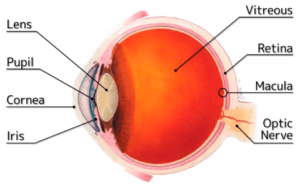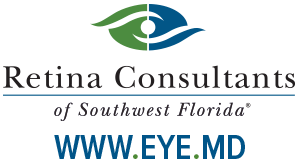Cystoid Macular Edema
Diseases of the Retina/Vitreous: Cystoid Macular Edema
What is Cystoid Macular Edema
 Cystoid Macular Edema is a painless disorder that affects the retina. The retina is the light-sensitive layer of tissue that lines the back wall of the eye and is responsible for vision. When this condition occurs, swelling develops in the macula, which is the central portion of the retina critical for seeing fine details clearly. These swollen areas fill with fluid, causing the macula to thicken.
Cystoid Macular Edema is a painless disorder that affects the retina. The retina is the light-sensitive layer of tissue that lines the back wall of the eye and is responsible for vision. When this condition occurs, swelling develops in the macula, which is the central portion of the retina critical for seeing fine details clearly. These swollen areas fill with fluid, causing the macula to thicken.
What causes Cystoid Macular Edema?
The exact cause of CME is not known, but there are many diseases that may contribute to the onset of the disease, such as retinal vein occlusions, eye inflammation, and diabetes. CME occurs most commonly after cataract surgery. Usually, CME will occur within the first year after having the cataract removed. A small percentage of people may experience reduced vision because of CME.
What are the Symptoms of Cystoid Macular Edema?
 Blurry or decreased vision is the most common symptom. Distortion also may be a symptom of CME. However, there have been cases where CME has been present without any visual complaints from the patient.
Blurry or decreased vision is the most common symptom. Distortion also may be a symptom of CME. However, there have been cases where CME has been present without any visual complaints from the patient.
How is Cystoid Macular Edema Detected
Your eye doctor will use eye drops to dilate or enlarge your pupils. Dilating the pupils allows your eye doctor to view the back of the eye better. You may need testing, including a fluorescein angiography. Fluorescein angiography is a diagnostic test that uses a drug called fluorescein that is injected into a vein in your arm. It is used to enhance the specialized photograph that is taken to evaluate the retina.
What are the Treatment Options?
There are many different treatment options available, depending upon your specific diagnosis. Your retina doctor may prescribe topical anti-inflammatory eye drops, oral diuretic medications, or oral steroid or nonsteroidal medications to reduce the swelling.
The vitreous is the jelly-like substance that fills the eyeball. Sometimes, it may pull away from the macula, causing CME. If that occurs, an operation called a “vitrectomy” may be recommended.
In a vitrectomy, the vitreous is removed and replaced with a gas bubble or saline-like fluid. This surgical procedure is done on an outpatient basis in a hospital.
Your retina doctor will recommend the most appropriate option for you, based on your diagnosis. Everyone responds to different treatments in varying ways, so there is no one “best” way to treat CME.
It is not possible to predict how long it may take for you to respond to treatment, although most cases are resolved within several weeks to months. In some instances, recovery may require an even longer period of time.
Video: Laser Treatment for Macular Edema
What You Can Do to Protect Your Vision
Early detection and treatment, is the best way to prevent vision loss. Regular yearly examinations by your eye doctor are extremely important because eye problems can develop at any age.
Making the Most of Your Remaining Vision
 Early detection and treatment may reduce the loss of vision from Diabetic Retinopathy. However, if some loss of vision should occur, it doesn’t have to rob you of life’s simplest pleasures if you learn how to use your remaining eyesight to see your best. Low vision aids, special lenses, or electronic systems and training can maximize your ability to read and perform other activities.
Early detection and treatment may reduce the loss of vision from Diabetic Retinopathy. However, if some loss of vision should occur, it doesn’t have to rob you of life’s simplest pleasures if you learn how to use your remaining eyesight to see your best. Low vision aids, special lenses, or electronic systems and training can maximize your ability to read and perform other activities.
The Low Vision Rehabilitation Center of Retina Consultants of Southwest Florida can give you more information about the training and devices available.
